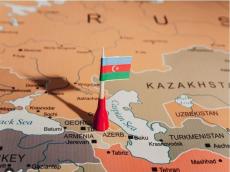Today.Az » Analytics » Israeli media spotlights Azerbaijan’s rising regional clout as strategic Eurasian mediator
21 April 2025 [19:57] - Today.Az

A comprehensive analysis published in the Israeli daily Maariv underscores Azerbaijan’s growing strategic influence in the South Caucasus and beyond, highlighting its dynamic multi-vector foreign policy and deepening partnerships with both Israel and Türkiye. The article—authored by political analyst Dr. Anat Hochberg-Marom—emphasizes that Azerbaijan is emerging not only as an energy power, but also as a diplomatic, military, and geopolitical player in the region. Azerbaijan as a regional mediator One of the key takeaways of the analysis is Azerbaijan’s role as a bridge between Israel and Türkiye, two regional allies with a history of fluctuating relations. Against the backdrop of ongoing tensions with Iran, Azerbaijan’s mediation efforts are seen as both timely and beneficial—strengthening Baku’s diplomatic profile while contributing to broader regional stability. President Ilham Aliyev’s recent remarks on the need for de-escalation between Ankara and Tel Aviv, particularly in light of their diverging positions on Syria, reaffirm Baku’s commitment to acting as a stabilizing force. The article notes that Azerbaijan played a similar role during the 2022 normalization phase between the two countries and stands ready to support a renewed reconciliation process. With Türkiye boosting its military presence in Syria and Israel viewing this as a growing concern, Baku’s diplomatic mediation is considered crucial in preventing further escalation. Backing from Washington and international partners The Maariv article further notes that the United States, under President Donald Trump, has welcomed efforts to establish dialogue channels between Israel and Türkiye, viewing Azerbaijan as a credible and neutral facilitator. If successful, such initiatives could lay the foundation for a new axis of stability between Baku, Ankara, and Jerusalem, solidifying Azerbaijan’s strategic footprint in both the South Caucasus and the broader Eurasian landscape. “Realpolitik” and strategic balance Dr. Hochberg-Marom also draws attention to Azerbaijan’s carefully calibrated foreign policy—marked by its historic and economic closeness to Türkiye and simultaneously strategic loyalty to Israel. In 2024, trade turnover between Azerbaijan and Türkiye reached $6.13 billion, while Azerbaijan’s exports to Israel stood at $898 million—outpacing total exports to all Arab states combined. Azerbaijan’s influence in Israel’s energy sector is also expanding: state oil company SOCAR holds a 10% stake in the Tamar gas field, further tying Baku into the Eastern Mediterranean energy network. On the defense front, Israel remains a key partner, supplying UAVs, radar systems, and advanced military technology to Azerbaijan. Between 2018 and 2022, 9% of Israel’s total defense exports were directed to Baku. Iran: a relationship marked by tension and pragmatism While the trade turnover between Azerbaijan and Iran reached $580 million in 2024, the relationship remains fraught. The article points to Iran’s open support for Armenia and its antagonistic stance towards Israel as major friction points. Tensions were further aggravated by the recent foiling of an Iranian plot to assassinate the leader of Azerbaijan’s Jewish community. Strategic outlook: beyond energy Ultimately, Maariv concludes that Azerbaijan is no longer merely an energy supplier—it is transforming into a regional power with diplomatic agility, economic strength, and geopolitical ambition. While it may not be able to resolve entrenched conflicts such as the Israeli-Palestinian issue or the deep divide between Türkiye and Israel, Baku is positioned to leverage these dynamics to its advantage. By deepening energy ties with Türkiye, enhancing technological and defense cooperation with Israel, and seeking closer strategic alignment with Washington, including interest in joining the Abraham Accords, Azerbaijan is steadily reinforcing its regional influence. As the article puts it: "Baku is no longer just the oil-rich capital of the Caucasus—it is emerging as a key player shaping the future of Eurasia and the Middle East." Note: This article is a translated and adapted version of Dr. Anat Hochberg-Marom’s original analysis published in Israel’s "Maariv" newspaper.
|